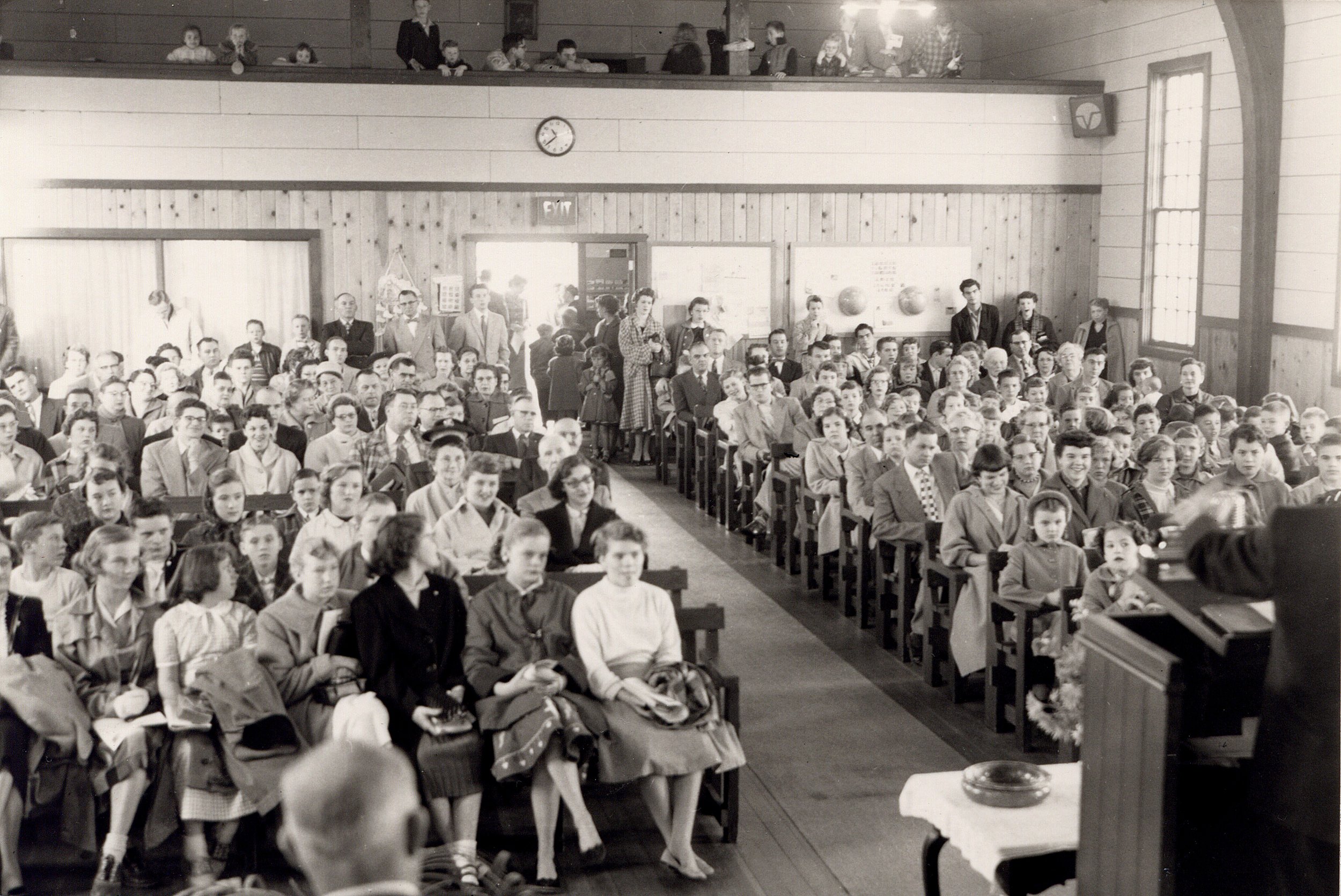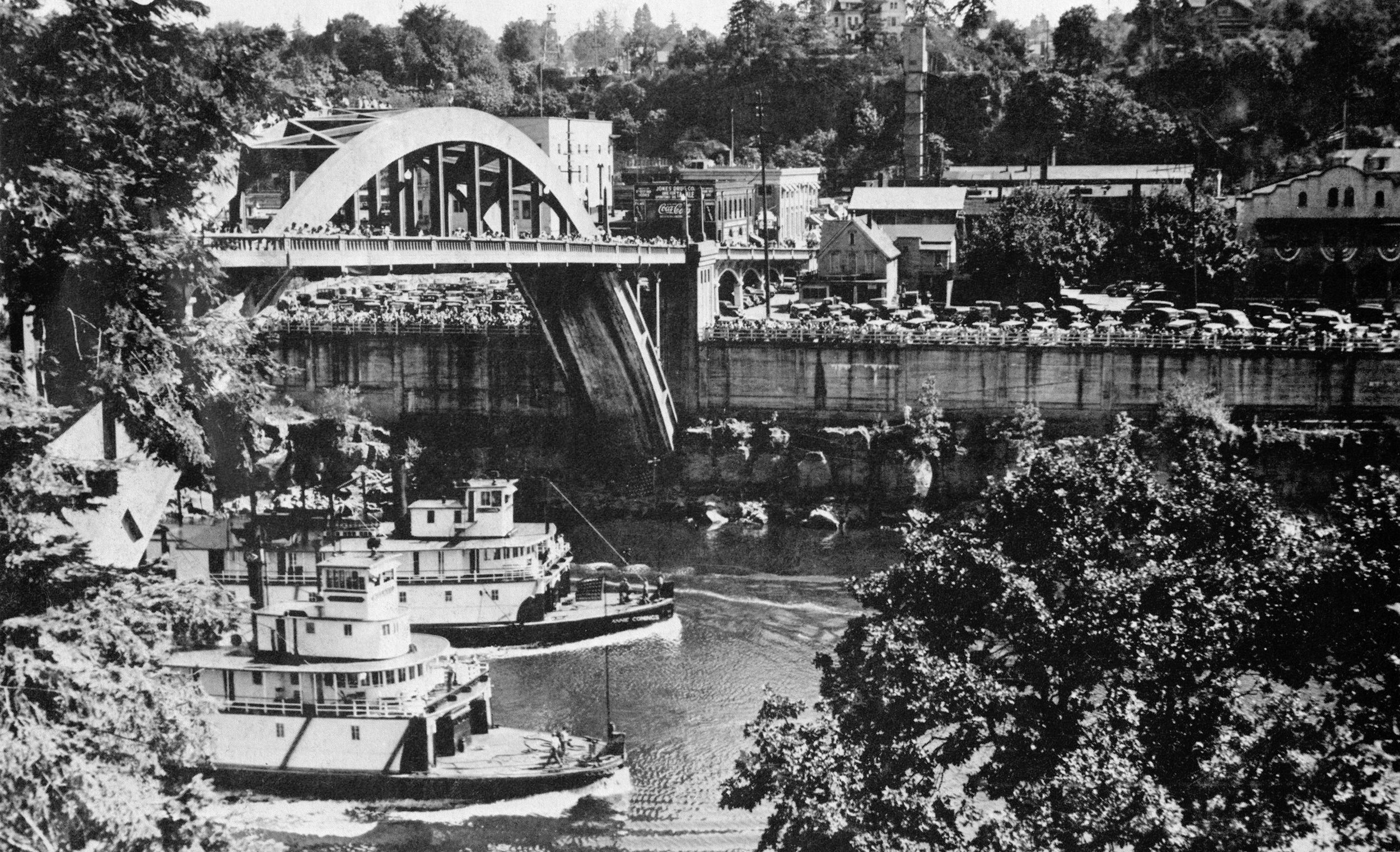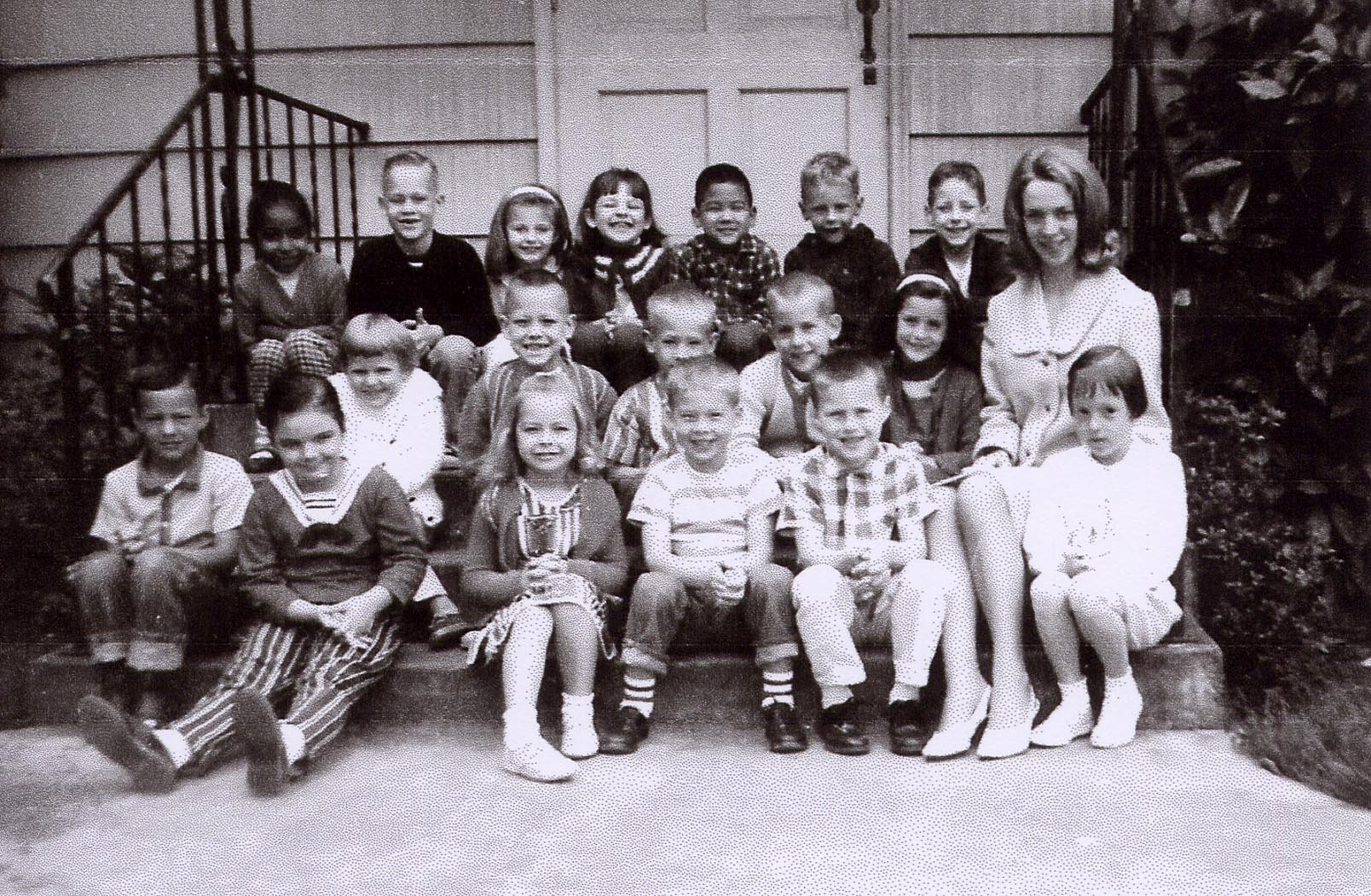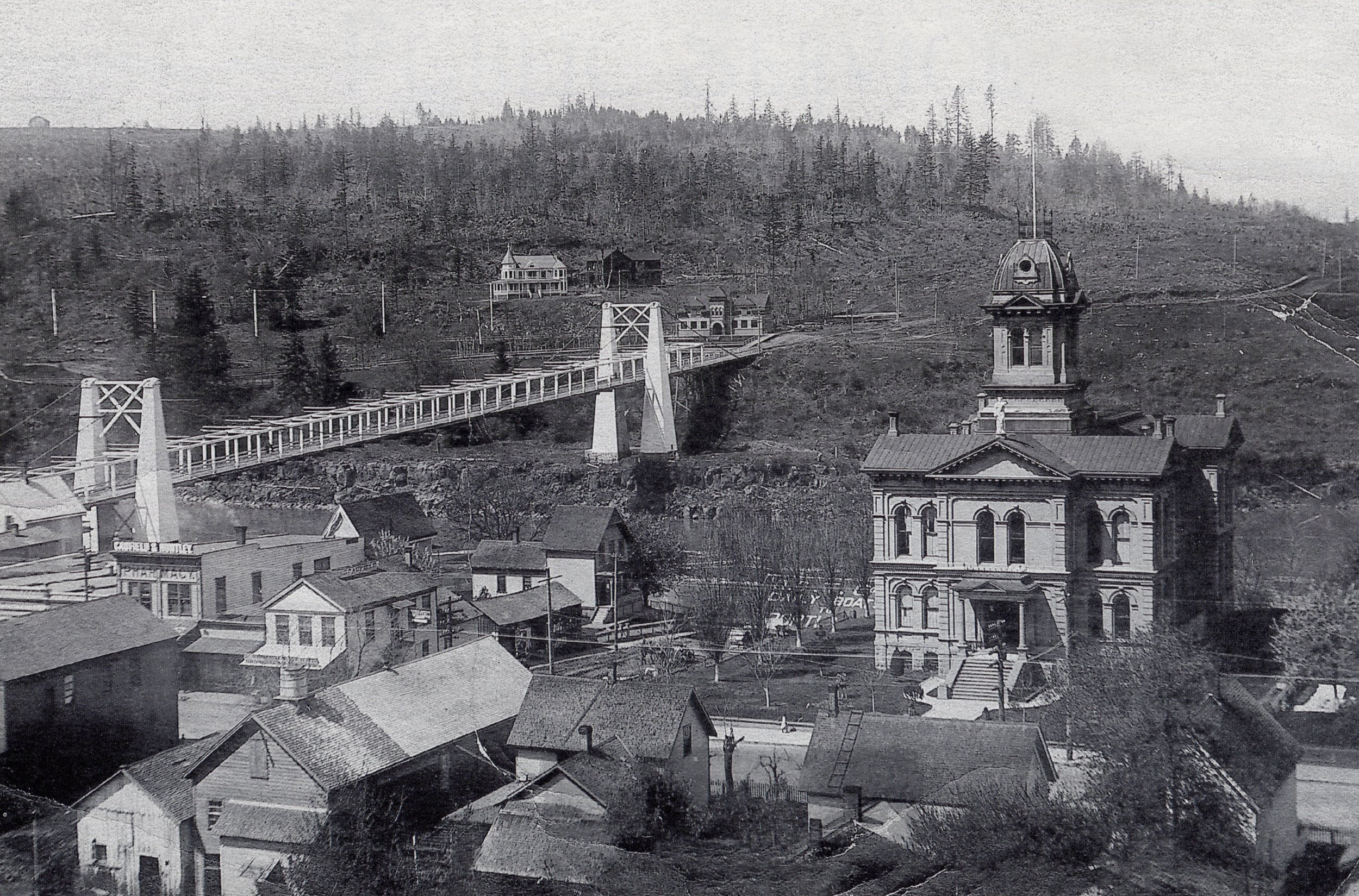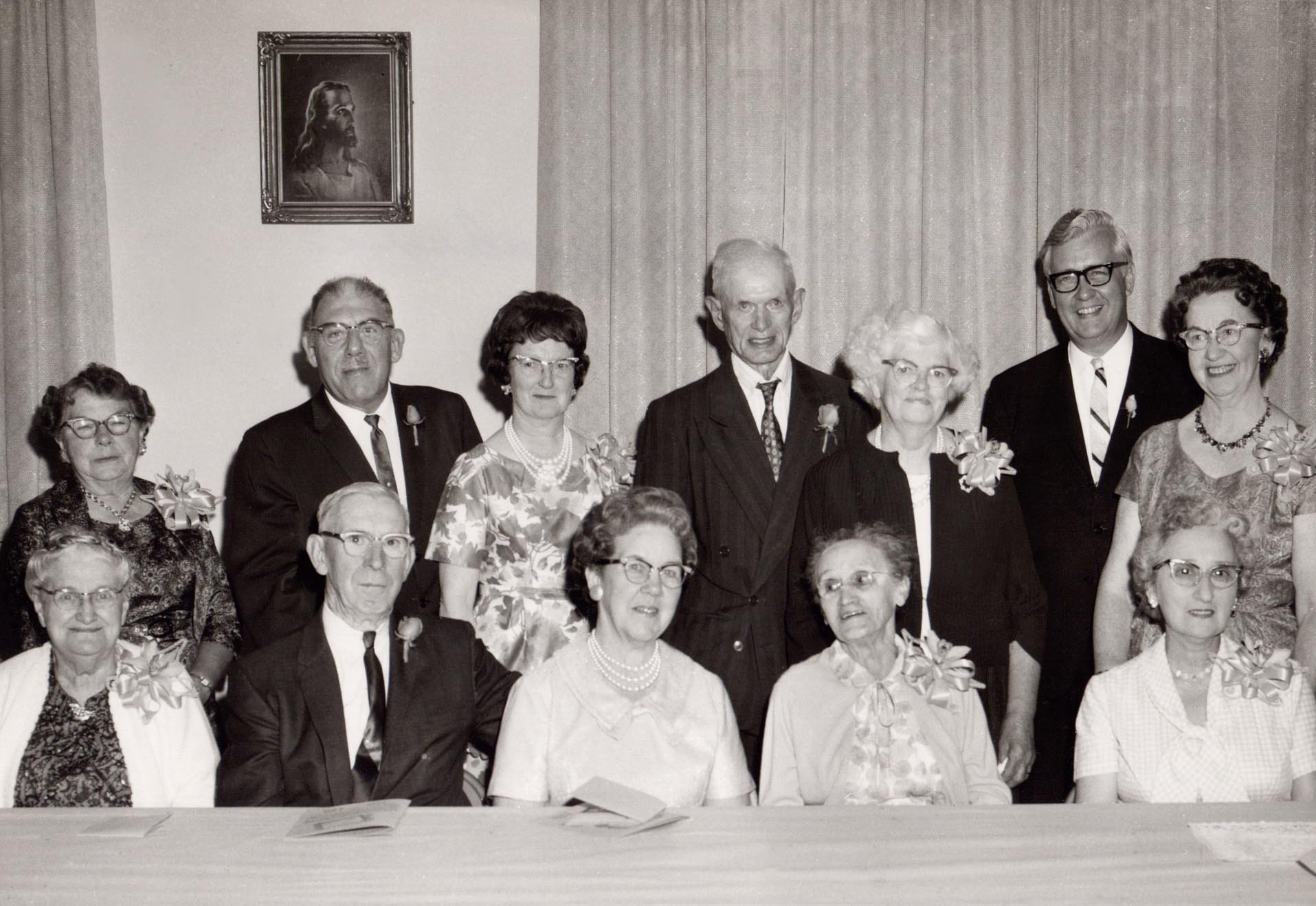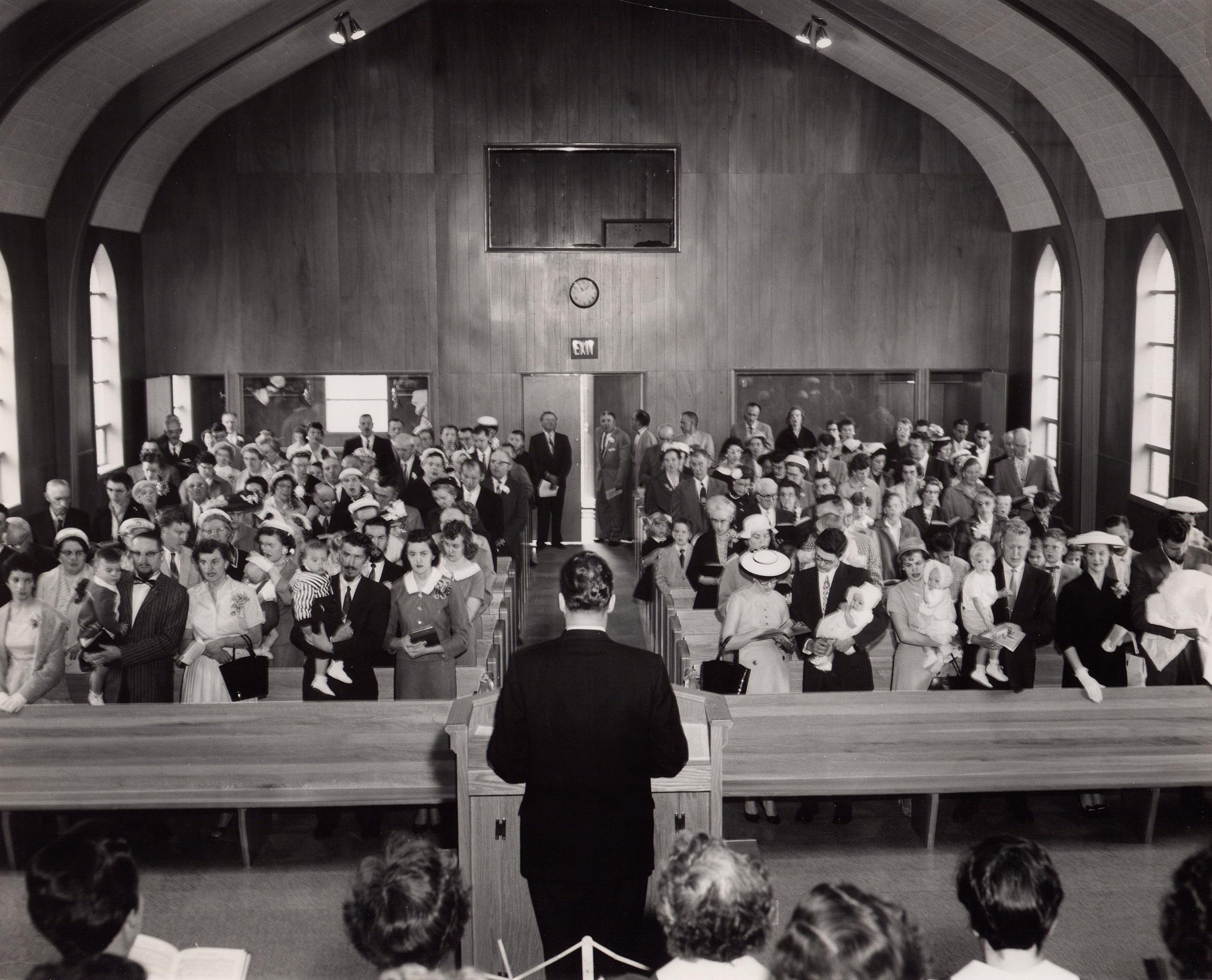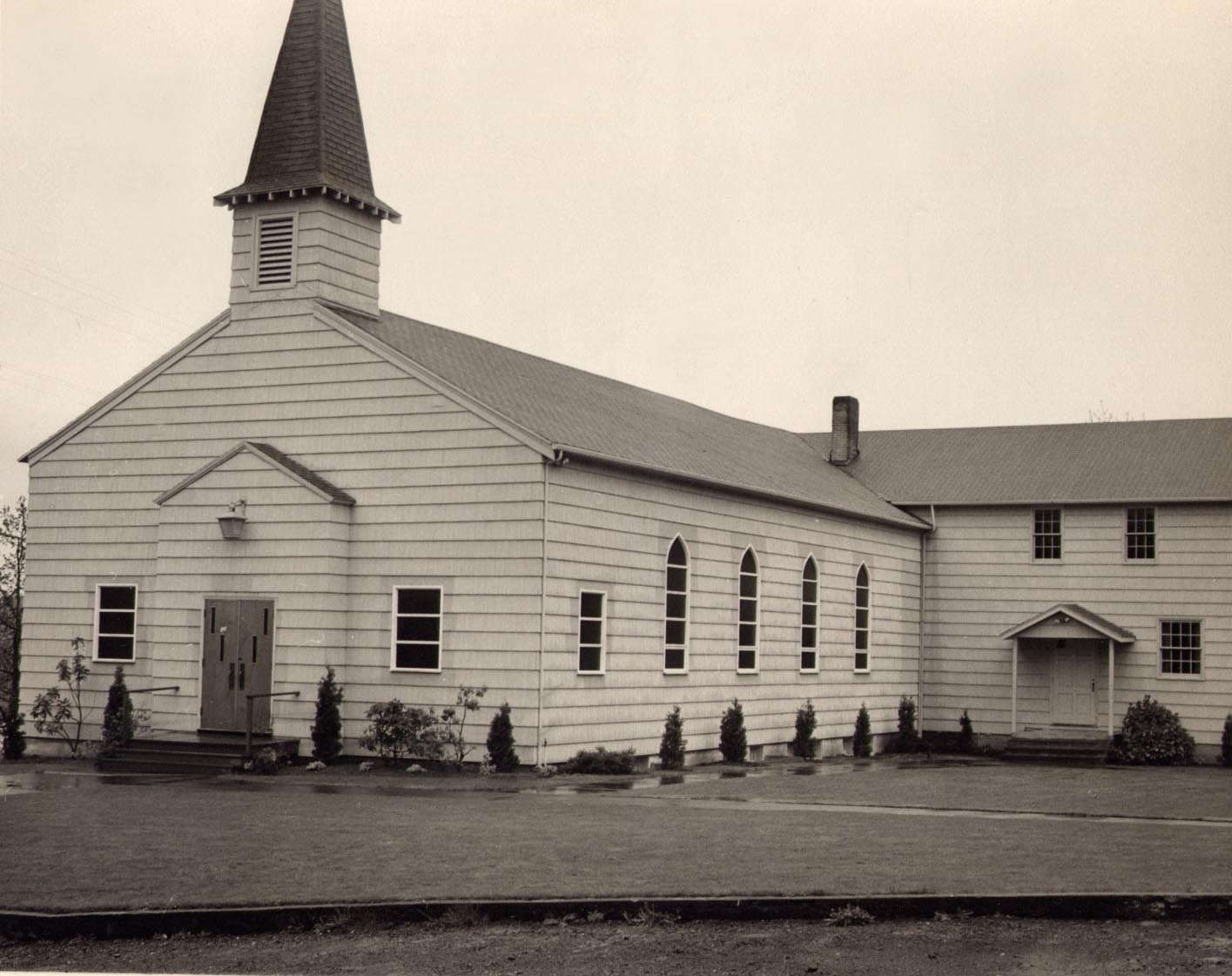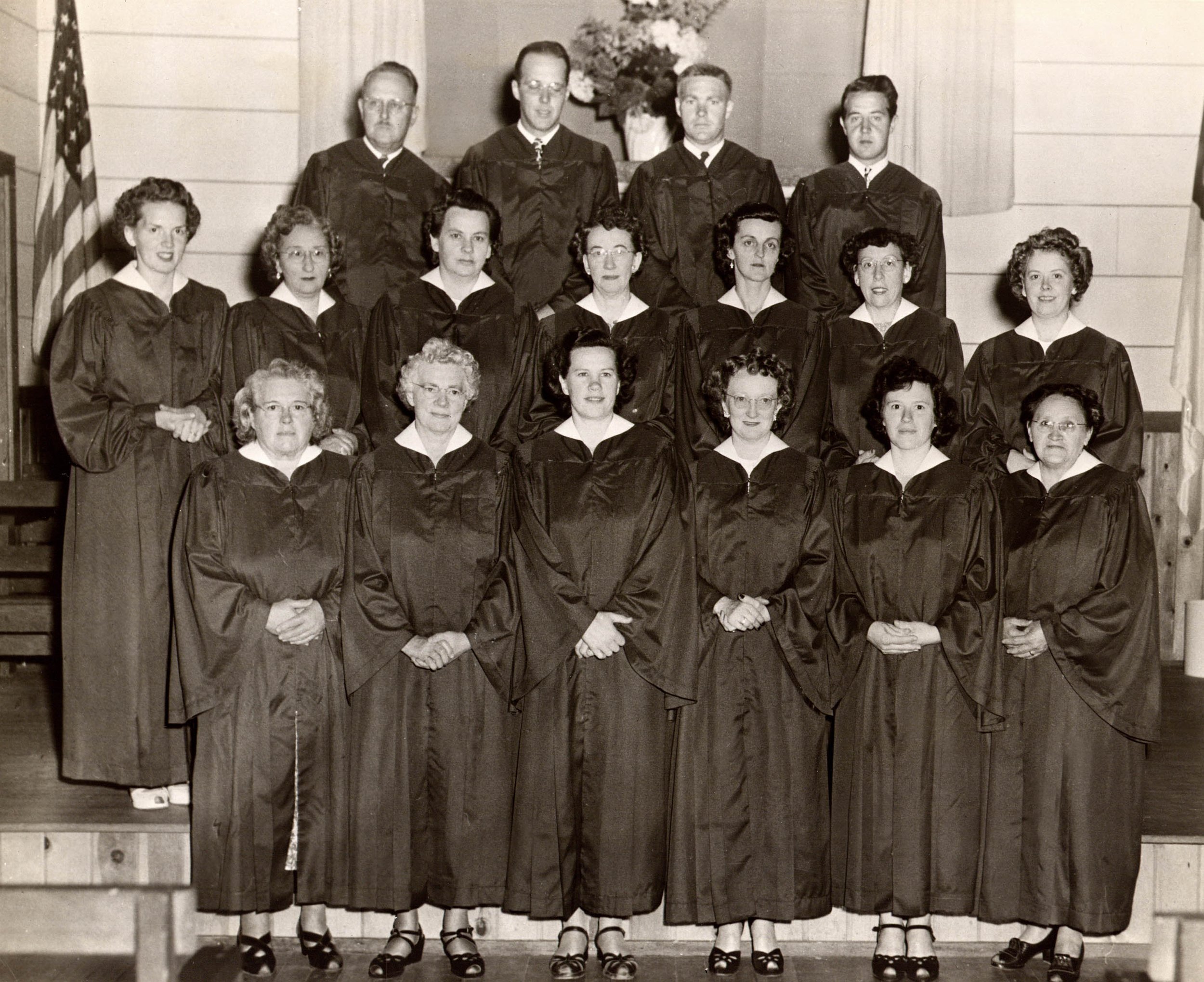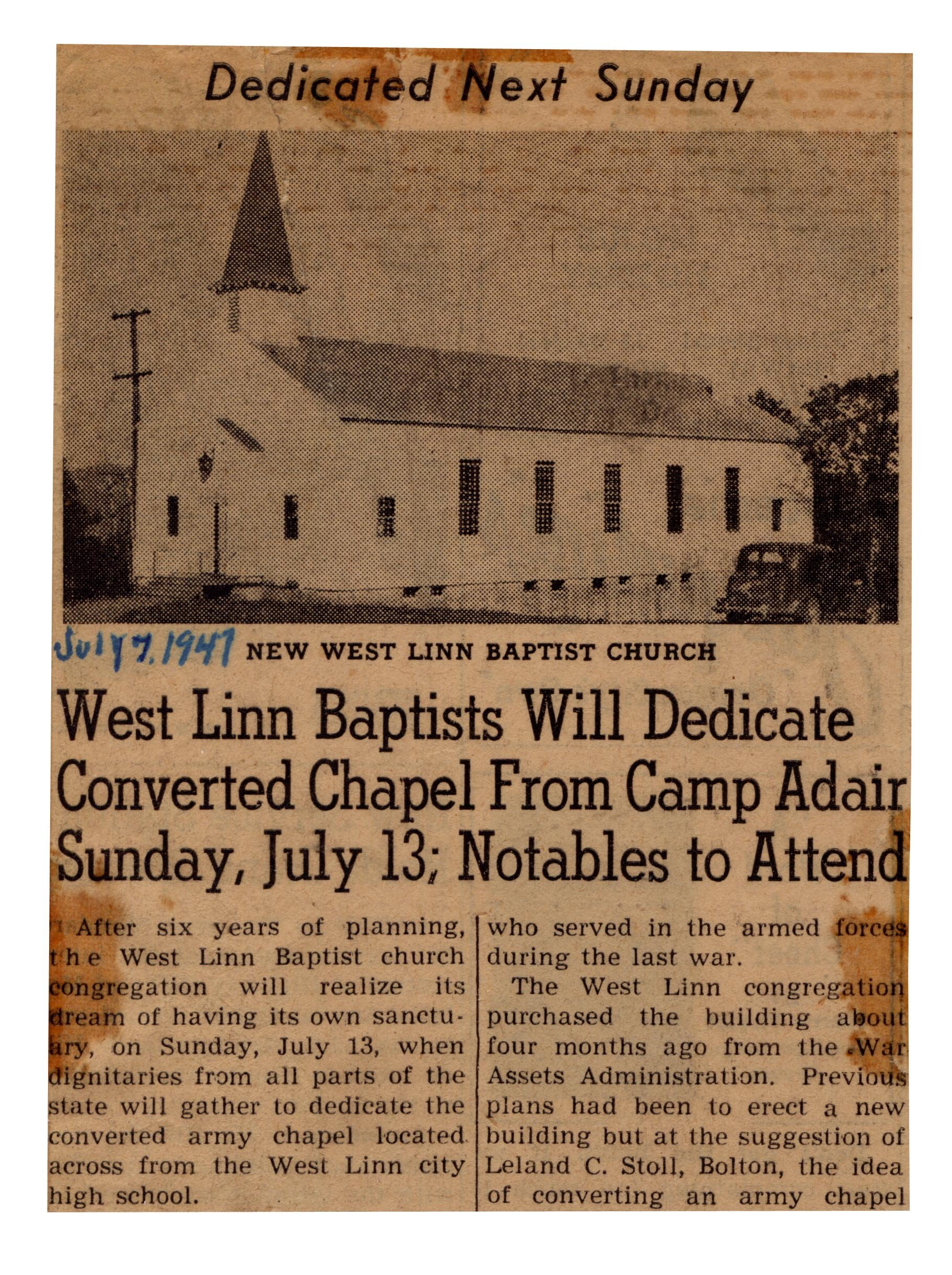Our History
New Life Church began as West Linn First Baptist Church in 1941 when a group from Oregon City First Baptist Church planted a church on the west side of the Willamette River. Oregon City First Baptist Church is the oldest Baptist church west of the Rockies.
Theological liberalism that eventually prompted the birth of the Conservative Baptist Movement also motivated these 43 church planters. They realized a need for a Bible-preaching church on the west side of the river. So, in 1946 they deconstructed an army chapel the bought for $850 from Camp Adair, barged it down the river, and reconstructed it as their church home across the street from West Linn High School.
At that time West Linn was a small mill town of 2,000 people. It had only one industry, a paper mill built on the west side of Willamette Falls. Highway 43 connected West Linn to Lake Oswego and more distantly Portland, Oregon. How times have changed!
West Linn Baptist Church had had 14 pastors in 52 years when Scott Reavely became the pastor in 1993. He became the fourth pastor in a ten-year span. A pivotal event occurred in June of 1995. We held a reconciliation service designed to take responsibility for the past's difficulties, repent, and ask forgiveness. Nothing happened quickly, but the church has dramatically changed in the years since.
The church has 23 parking spots we can call our own. Unsure of the path forward the church tried to buy land and build a big church outside of town in 2002, only to have another church buy it out from under them. We then landed on the idea of church planting and have been working at it ever since. Easter of 2005 we unanimously changed the name from West Linn Baptist Church to New Life Church to lay the groundwork for our multi-location strategy.
New Life Church Structure
New Life Church is a multi-site church. That means that we have one church with multiple locations. All our congregations share a mission, vision, and values. We all hold to the same statement of faith. We support a common budget and missionaries. Each congregation has its own elders. Of those congregational elders, representatives serve on an Executive Team that governs the entire organization.
As the diagram shows (from right to left), each individual belongs to a life group, which is part of a congregation, which in turn is part of New Life Church.
We have multiple locations for several reasons. We believe in the small church. Our goal is to have a larger organization that can support the personal and meaningful ministry of a smaller congregation. We believe that we can have an impact in a city by having a kingdom outpost there rather than expecting people to drive to our big box building out of town. We believe that ministry happens in relationships. Those relationships happen more easily in a smaller context. They happen when we are local and know the people who live and work where we have a neighborhood church.
Centrality of the Gospel
We want the good news of Jesus, the gospel, to be central at New Life Church. It is very common to believe that you need the gospel to be reconciled with God, then after that, you need to be on your best behavior. Or, to say it another way, that you become a Christian by believing the gospel and stay a Christian by working hard.
The gospel is the power of God unto salvation (Romans 1:16). That means the gospel has inherent power. To believe it is to tap into that power. You remain a Christian in the exact same way you stay a Christian — by believing the gospel (Colossians 2:6-7). Moralism and legalism are the results of abandoning the gospel and seeking to produce a Christian life in your own power.
We envision the gospel like a playground merry-go-round. You push on it and not much happens at first, but as you keep pushing, your friends begin to fly off because it turns so fast. Emphasizing the gospel itself will, over time, produce the aspects of the Christian life that we all desire and need — personal change, community, mission, and service. If you’d like to hear more, view Pastor Scott’s sermon on the Gospel and how it needs to be the center of the Christian life.
New Life Church aims to keep emphasizing the gospel, pushing on the merry-go-round, trusting that God will produce healthy disciples and a healthy church through his power (Galatians 5:22-23).
OUR BELIEFS
Our basic doctrinal statement represents those truths we hold to be the central and historic doctrines of the faith found in the Scriptures.
-
We believe the Scripture of the Old and New Testaments is verbally inspired by God and without error in the original writings. The sixty-six books of the Old and New Testaments are the complete and sufficient revelation of God. God has supernaturally preserved His word through the ages so as to be entirely reliable.
2 Tim. 3:16-17; 2 Pet. 1:19-2; John 17:17; Romans 3:4; John 20:30-31; Matt. 24:35
-
We believe God is knowable because He has revealed himself as He wishes to be known. We believe in one eternal, sovereign God, creator of all. God has one essence, eternally existing in three persons: Father, Son, and Holy Spirit. The three persons of the Trinity share precisely the same eternal substance, yet function individually in administration and in relation to one another. We believe God is omniscient, that He knows all things, past, present, and future.
Rom. 1:18-20; John 1:18; 1 Cor. 2:16; Deut. 6:4; Matt. 3:16-17; 28:19; Isa. 46:10
-
We believe in God the Father. He is spirit, infinite and perfect in holiness, wisdom, power and love. We believe that He concerns Himself mercifully in the affairs of men, that He hears and answers prayer, and that He saves from sin and death all who come to Him through Jesus Christ.
Luke 10:21,22; John 4:24, Matt. 23:9; John 3:16; 6:27; Rom. 1:7; 1 Tim. 1:1,2; 2:5,6; 1 Pet. 1:3; Rev. 1:6
-
We believe Jesus Christ is fully God and fully man, conceived by the Holy Spirit and born of a virgin. He lived a sinless life and atoned for our sins by shedding His blood on the cross. He was resurrected bodily and ascended to heaven where He lives as the advocate for believers.
Matt. 1:20-23; John 1:1,2; Rom. 3:24, 25; Rom. 8:34; Phil 2:5-10; 2 Cor. 5:21; Heb. 1:1-3; Heb. 7:25
-
We believe in God the Holy Spirit who proceeds from the Father and the Son to convict the world of sin, righteousness and judgment. His ministry is to bring glory to God. He regenerates, sanctifies, comforts, indwells and empowers all who believe. He baptizes individuals into the body of Christ at the moment of their salvation and guarantees their perseverance.
John 14:16,17,26; 16:7-15; Rom. 8:9; 1 Cor. 3:16; 6:19; Gal. 5:22-26; Eph. 1:13-14
-
We believe mankind was created in God's image and in fellowship with God, but due to sin the image of God was marred and fellowship with God was broken. The consequence of sin is physical, spiritual and eternal death which is separation from God. Everyone is, therefore, a sinner by nature and choice and is under condemnation.
Gen. 1:26; Gen. 3; Rom. 3:23; 6:23; Jer. 17:9; John 3:18; Eph. 2:1-3
-
The salvation of man is wholly a work of God's free grace and is not the work, in whole or in part, of human works or goodness or religious ceremony. God regenerates and imputes His righteousness to those who repent and forsake their sin and put their faith in Christ alone for their salvation. He thereby justifies them in His sight. They become new creatures and are delivered from condemnation and receive eternal life and a relationship with God.
Eph. 2:8-9; Titus 3:4-7; John 3:16-17; Rom. 3:24-26; 2 Cor. 5:17; Rom. 8:1; 1 John 5:11-13; John 1:12
-
We believe Christ's Church is a living spiritual body composed of regenerate persons of which Christ is head. Our local Church membership shall consist of baptized believers associated by a covenant of faith, who worship and fellowship together, and observe the ordinances of baptism by immersion and the Lord's supper. We believe that God has laid upon the members of the local church the primary task of giving the gospel of Jesus Christ to a lost world.
1 Cor. 12:12; Eph. 1:22-23; Eph. 2:19-22; Phil. 1:1; Acts 2:42; Acts 1:8; Matt. 28:19-20; 1 Cor. 11:23-26
-
We believe in the personal, visible, and imminent return of Jesus Christ. The just shall be raised bodily to everlasting joy in heaven, and the unjust to everlasting conscious punishment in hell.
1 Thess. 4:15-17; Acts 1:11; John 14:1-4; Rev. 20:4-6, 11-15; 2 Tim. 4:1; Phil 3:20; Psalm 16:11; Matt. 16:27; 2 Thess. 1:7-10


